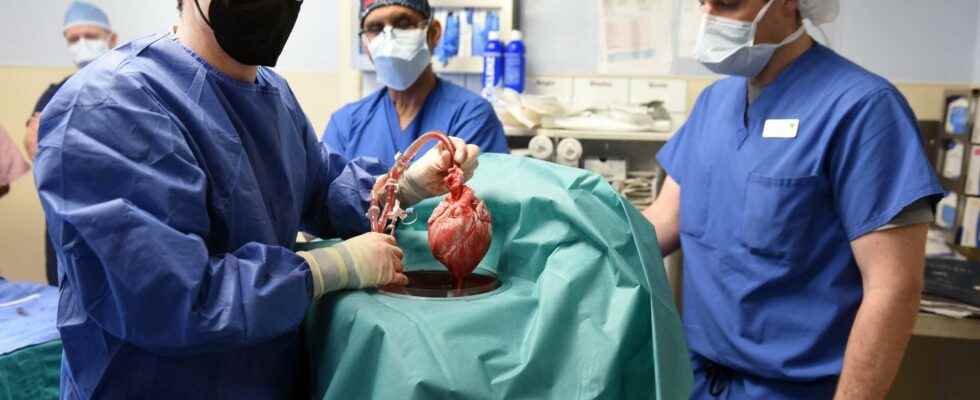David Bennett, first man to have a genetically modified pig’s heart transplant, died two months after the operation, March 10, 2022. A statement from the University of Arizona spokesperson said no obvious cause had been identified and a full report was pending. On April 20, during a webinar of the’American Society of Transplantationone of David Bennett’s doctors explained that the graft was contaminated with a virus porcine. Is the latter directly or indirectly involved in his death? The question is not yet settled.
A virus hidden in the graft
The porcine virus in question is a cytomegalovirus, a virus which first infects mucous membranes nasal passages of the animal before staying latent in other organs, which was not detected before transplantation. The society Revivicor Inc. who provided the pig’s heart, genetically modified and presumed free of pathogens, did not comment on the subject. According to information relayed by an article from MIT Technology Reviewsporcine cytomegalovirus is not able to infect human cells, but could have damaged the graft and caused a deleterious inflammatory reaction.
In all likelihood, David Bennett’s death was caused by several factors. He was very ill before the graft which has been approved by the FDA because there was no longer any alternative to treat him. It seems to be a syndrome generalized inflammation, possibly fueled by cytomegalovirus, which caused graft failure. Similar cases have been observed in porcine heart xenografts on the baboons done in Germany in 2020. The virus had considerably reduced the duration life of transplanted animals.
Despite the tragic outcome of the procedure, David Bennett’s body showed no signs of graft rejection, even several weeks after the operation. The pig from which the heart was taken had been genetically modified – with ten mutations genetic – precisely for this purpose. The ethical issues around xenografts are still hotly debated within the scientific community. And the question of viral contamination raised by David Bennett’s story shows that there is still a lot of research to be done before xenografts become routine surgery for all patients awaiting a transplant.
First successful transplant of a humanized pig heart on a patient
Article published on January 15, 2022 by Julie Kern
Doctors from Baltimore, Maryland successfully performed a xenograft one of a kind. A genetically modified pig’s heart has been transplanted into a 57-year-old man with end-stage heart disease.
At 57, David Bennett, a resident of Maryland in the United States, is condemned to live in a hospital bed because of a serious heart disease. His state of health does not allow him to be eligible for a heart transplant and his problemsarrhythmia deprive him of a artificial heart. Doctors from the University of Maryland then offered him an experimental last resort: to be transplanted a genetically modified pig’s heart. An operation never performed before on a patient with end-stage heart disease.
David Bennett agrees: it was either die or do this transplant. I want to live. I know it’s a risky attempt, but it’s my last choice “, he explains. The operation took place on January 7, 2022 and according to the press release from the University of Marylandwhich retraces this incredible operation, David Bennett door well, three days after the transplant.
A transplanted humanized pig’s heart
The transplanted heart comes from a genetically modified pig. A total of ten genetic modifications were made to maximize the chances of a successful transplant: three genes deleted to limit rejection, six human genes added so that the heart is better accepted by immunity and a final gene to contain growth. porcine tissues. The heart was removed from the animal by the same surgeons who performed the transplant and placed in a special box that kept it alive ex long live before transplant.
Preliminary animal studies showed that a pig’s heart grafted onto a monkey worked beyond three years. Based on this data and on David’s hopeless case, the FDA authorized this experiment on a compassionate basis. There are still many unknowns around xenografts for these operations to become routine procedures. Are the benefits for patients greater than the risks they incur? ” The success of the procedure has provided valuable information to help the medical community improve this potentially life-saving method in future patients. said Muhammad M. Mohiuddin, one of the professors of surgery who performed the transplant.
A step closer to xenografts
If this type of operation offers hope for patients awaiting a transplant, the use of xenografts also raises important ethical questions about the use of animal organs in human medicine, but also around all experiments animals that it requires.
In 2020, 370 heart transplants have been performed in France. Patients are transplanted, in most cases, within a year of enrolment. But for some, this delay is too long and their health deteriorates before an organ is available. The use of xenografts could reduce waiting in the future. ” This transplantation is revolutionary, and a further step in the study of xeno-organs for human use said David Ayares, chief scientific officer of Revivicor Inc., the company that supplied the pig to doctors.
Interested in what you just read?
